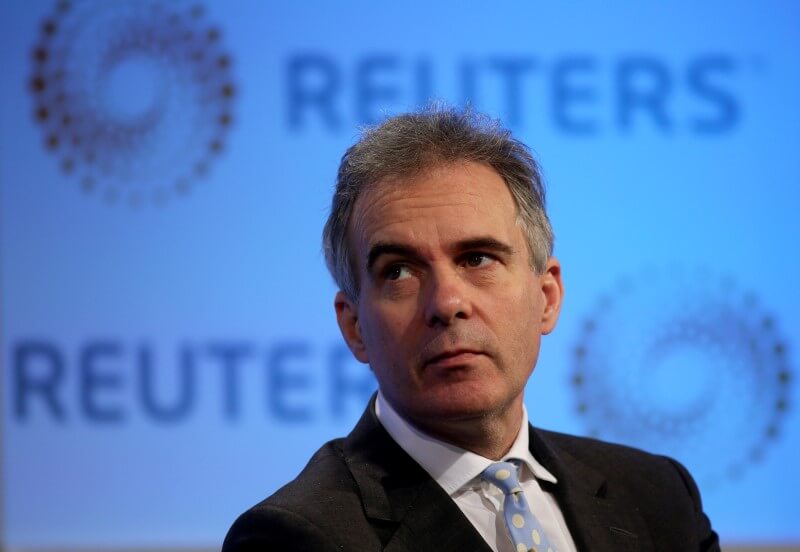By David Milliken
LONDON (Reuters) – Bank of England Deputy Governor Ben Broadbent said on Friday he would support cutting interest rates again this year, but ruled out using a new bank funding scheme to bring in negative rates by the back door. Broadbent said he was closely watching the labor market to gauge the hit to Britain’s economy from June’s vote to leave the European Union, and pointed to a survey overnight that showed the biggest fall in permanent hiring since 2009. The BoE unleashed its biggest package of stimulus since the financial crisis on Thursday, reducing its main interest rate to a record-low 0.25 percent, restarting quantitative easing and launching new plans to buy corporate debt and offer cheap credit to lenders. The central bank also said most of its nine-member Monetary Policy Committee expected to cut rates even closer to zero later in 2016, and Broadbent said that included him.
“There was a majority that expected to vote to cut interest rates again, were the economy to unfold in line with forecasts, and yes, I was one,” Broadbent said in an interview at the Bank of England, which was attended by two other news organizations. Asked if the BoE’s decision to act more aggressively than most economists had expected was driven by private information about the hit from Brexit, Broadbent said: “No, no, no.”
The deputy governor, who joined the MPC in 2011 after working as an economist at investment bank Goldman Sachs, said the Bank still had plenty of options to stimulate the economy.
As well as a rate cut, Broadbent said the BoE could increase the target for government bond holdings before it completed the 60 billion pounds ($79 billion) of purchases it announced on Thursday, which are scheduled to take six months. The BoE has also started to buy corporate bonds in big quantities for the first time, and Broadbent did not rule out buying exchange-traded funds which hold company shares in future, though the MPC has not considered this yet. “I do think it is a material risk but it is not qualitatively something we haven’t done before. You would have to think through it very seriously, but … I am not in a position to give a steer on it,” he said, joking he was too tired after Thursday’s raft of announcements. The Bank of Japan has bought billions of dollars worth of shares through ETFs to stimulate its economy, but the BoE has been reticent about doing the same, in part because it is riskier than buying investment-grade corporate debt. Neither monetary policy nor extra stimulus from tax cuts or more government spending could fully offset the hit Britain was likely to suffer as a result of leaving the EU, Broadbent said.
“There are limits to what monetary policy, indeed any demand-management policy can do – conventional fiscal policy as well – to offset what is a structural effect on the economy.” Finance minister Philip Hammond said on Thursday the government and the BoE had all the tools they needed, and that he would review the government’s policy stance when he gives a mid-year budget update later in the year. NO NEGATIVE RATES
Philip Shaw, an economist at Investec, said Broadbent’s comments added to the sense that the BoE was already laying the groundwork for a cut in rates to 0.1 percent in November, but left open what the BoE would do if Britain entered recession. “It would probably also mean an increase in government bond purchases, higher corporate bond buying and possibly an extension to the Term Funding Scheme as well,” he said.
The Term Funding Scheme (TFS) was the other main prong of the BoE’s action on Thursday and makes up to 100 billion pounds of newly created central bank funds available to lenders at around the BoE’s new Bank Rate of 0.25 percent. The BoE said its aim was to ensure banks passed the full quarter percentage point cut in rates on to borrowers, though Broadbent said the BoE wanted to ensure this happened overall, rather than to police every single mortgage. Bank of England Governor Mark Carney said on Thursday that banks had “no excuse” not to pass on the rate cut. Most major banks have already done so, but Britain’s biggest mortgage lender, Lloyds Banking Group Unlike 2012’s Funding for Lending Scheme, the TFS was not designed to boost lending, Broadbent said.
“It’s not really the supply of credit that is the constraint on the economy,” he said. “In truth we didn’t expect much loan growth and nor did we expect some even if we offered more concessions for it.” The scheme would need to be retooled if the central bank cut rates closer to zero, he added.
But Broadbent said the BoE would not use it as a back-door way to introduce negative interest rates – something some analysts have speculated about, given Carney’s firm opposition to cutting the main Bank Rate below zero. “There are limits for us too. We would not want to offer that finance at hugely negative interest rates, because we would be making losses ourselves,” he said.
The European Central Bank’s experience with a somewhat similar scheme, the TLTRO II, showed that even central bank assistance to banks was not enough to stop a negative effect on lending when rates fell below zero, he added. ($1 = 0.7602 pounds)
(Editing by Andy Bruce and Catherine Evans)
Bank of England’s Broadbent says would back further cut in rates

By David Milliken
















